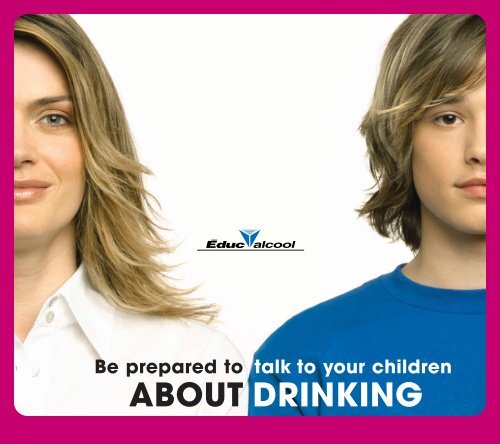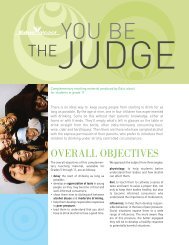Parents Guide - Ãduc'alcool
Parents Guide - Ãduc'alcool
Parents Guide - Ãduc'alcool
You also want an ePaper? Increase the reach of your titles
YUMPU automatically turns print PDFs into web optimized ePapers that Google loves.
Be prepared toABOUTtalk to your childrenDRINKING
HOW TO USE THIS GUIDEIf you have young children, pre-teens or olderteenagers, you are probably wonderinghow to behave with them and in front of them;what you should know so you can answer theirquestions and keep them informed;what you should say in certain situations.This guide is divided into three sections to helpyou in the process. Information is also colourcodedby age category, to make it easier to findwhat you’re looking for.Whatever the age of your childrenpp. 2 to 5 and 14 to 198 to 11-year-oldspp. 6-7 and 20-2112 to 14-year-oldspp. 8-9 and 22-23TABLE OF CONTENTSModeration is our only stand 1HOW TO BEHAVEWith your children, whatever their age 2With 8 to 11-year-olds 7With 12 to 14-year-olds 9With 15 to 16-year-olds 11With 17 to 18-year-olds 13WHAT YOU SHOULD KNOWThe physiological effects of alcohol 14The psychological effects of alcohol 17WHAT YOU SHOULD SAYTo children, whatever their age 19To 8 to 11-year-olds 20To 12 to 14-year-olds 22To 15 to 16-year-olds 24To 17 to 18-year-olds 26Acknowledgements 2815 to 16-year-oldspp. 10-11 and 24-2517 to 18-year-oldspp. 12-13 and 26-27If you see this pictogram,it is a hyperlink with www.educalcool.qc.caand its animated strips (in French only)À TOI DE JOUER.In this document, the masculine gender is used solely for stylistic purposes.
MODERATION IS OUR ONLY STANDBy the age of 14, nearly two thirds of children in Quebec have tried alcohol. That means there is a 66% chancethat your child is one of them.This is no small matter. Contrary to what neurologists and psychiatrists believed for so long, the brain of an adolescentis not yet fully developed. In fact, just like the body, it goes through a major transformation during this period.During the pre-teen and teenage years, the brain is “reconfigured” and the areas responsible for emotionsundergo particular modification. What’s more, the frontal lobe, which is involved in planning, strategizing,organization, concentration and attention, is last to mature. At the same time, puberty causes neurochemicaland hormonal changes that make kids more likely to engage in risky behaviour and seek intense experiences.In other words, many teens begin drinking at the very time when their strategic and planning skills are still poorand their desire for intense emotions is high. Clearly, parental guidance during this time is essential, especiallywhen it comes to drinking.The results of our research are clear: 90% of all Quebecers said they believed that parents are responsible forteaching children about drinking and telling them about the problems related to alcohol abuse.But parents are not aware of how important it is for them to talk to their children about drinking, the sooner thebetter, before problems develop, rather than after the fact. They also do not realize that, contrary to popularopinion, parents have a great deal of influence over their children when it comes to drinking. What they say,and, especially what they do, is of prime importance to their children’s future behaviour.This guide is based on three clear principles:• Éduc’alcool is providing parents with the information to help educate their children about drinking and betterhandle certain alcohol-related situations.• We are not dictating any particular line of conduct for parents to follow. It is up to them to decide if, at whatage, under what conditions and in what quantities their children will be allowed to drink.• Nevertheless, we do have a fundamental belief and a very clear stand: abusive drinking, drunkenness andintoxication are absolutely unacceptable. Under no circumstances should they be tolerated.One thing is certain: overdoing it once is overdoing it once too many. Whatever the circumstances,moderation is always in good taste.The Éduc’alcool Board of Directors1
Your attitude, your actions, your words, your choiceshave a major influence on your children.3
HOW TO BEHAVE with your children, whatever their ageAt what age can they start to drink?There is no particular age at which it is considered“normal” for children to start drinking. Even veryyoung children sense – and often understand – thedifference between alcoholic beverages and nonalcoholicones.You may think it is best to offer your child a littlewine at the family dinner table on special occasions,knowing full well that he could sneak a drinkbehind your back.In some societies, it is considered beneficial to introducechildren to drinking under controlled circumstances.Research shows that in these societies, theincidence of alcohol-related problems is lower.Whatever you decide, under no circumstancesshould alcohol abuse ever be tolerated. Not forthem, and not for you.Are your children afraid to talk to youabout drinking?Have you considered what your children might bethinking about all this? They may trust you and talkfreely with you. Or perhaps not. Maybe they areconcerned that• you’re going to worry too much;• you won’t let them go out with their friends;• you’ll ask far too many questions;• you’re too strict and don’t understandanything about what kids their age need;• you’re going to stick your nose into theirbusiness;• you won’t trust them anymore.4
It’s never too soonKids often know a lot more than we think. Six-yearoldsalready have a pretty good idea of what issocially acceptable behaviour for adults and chil -dren when it comes to alcohol. So you can starttalking to them about drinking at a very early age.Set the example yourselvesChildren tend to mimic the behaviour of those theylove and admire, especially that of their parents. It’sfairly safe to assume that your drinking habits are theones your children will adopt later on. If drinking,both socially and while dining, is a part of yourlifestyle, your children will grow up assuming that thiskind of drinking is natural and occurs under happy,relaxed circumstances.When you drink, drink moderately. Your attitude willset an example for your kids. If you or others in yourcircle abstain from drinking, you can simply point outthat this is a personal choice.The age of the first drink is crucial• The earlier the child starts to drink, outsideof strictly controlled circumstances, thegreater the risk that he will have problemswith drinking in the future.• The earlier that teenagers start drinking,the more frequently they say they drink.5
One in four 9-year-olds has tried drinking.
HOW TO BEHAVE with 8 to 11-year-oldsBe firm• Don’t imagine that children this age do not drink, even if alcohol is not a drink for children.• Just because you are having a drink doesn’t mean your children may. At a family occasion, youryoungster may ask for a sip. He may whine and carry on. This is the time to take a clear stand.• You may allow him to wet his lips or take a tiny sip from your glass, so that he won’t be tempted totry it behind your back, say, when the glasses are being cleared from the table or when she finds abottle left behind.• Allowing that little taste or a sip of something cut with water gives children an experience some ofthem are very eager for. It does not, however, give them outright permission to drink.• Explain the difference between drinking in moderation and abusing alcohol.The idea is not for you to avoid drinking because of the children, but rather to show them that there isenjoyment in drinking moderately.Every parent has a decision to make with each child, based on the age of the child and your own principles.Whatever you decide, stick to it. Explaining the reasons for your decision will help your childrendevelop the ability to make their own informed decisions.At children’s parties, be sure that…• there are organized games and activities;• there are plenty of snacks, soft drinks and juices;• an adult is around (not necessarily present every second, but always nearby).Never leave children alone for the entire evening without supervision.7
Over one-quarter of 13-year-olds drink alcohol:2.7% just about every week and 24% just about every month or less.
HOW TO BEHAVE with 12 to 14-year-oldsBe vigilantThis is the age when teens start to experiment and test parental authority. They are looking to assert themselvesand they want to try drinking to see what it feels like.Don’t panicIf you discover that, despite your strict rule against it, your child has been drinking outside the house, don’tpanic and don’t overreact. Kids who want to try drinking are obviously not going to do it at home or atschool, where it is forbidden: they will do it at a party, in a park, in an alley or at a friend’s house. Aboveall, do not take it for granted that what is socially acceptable for you is the same for them.Be firm• Explain to your child how alcohol affects the body and the kind of risks that are involved in drinking.• Be clear about your expectations and establish very specific rules that are reasonable and enforceable.• You may even want to sign an agreement, setting out very clearly the terms of the agreement, andthe consequences if the child does not abide by them. Once you make an agreement, be sure youstick to it.If, in your family, youngsters and teens are allowed to drink small quantities of alcohol on special occasions,make sure they understand the difference between those special occasions and the rest of thetime.9
24% of 16-year-olds drink alcohol just about every week.Just 23% of 16-year-olds have never had a drink.
HOW TO BEHAVE with 15 to 16-year-oldsPeer pressureThis is the age when teens assert themselves more. They go out with groups of friends more often, andthere is pressure by some of the group “leaders” to do what everyone else is doing. At parties, theywill surely want to have beer. Now is the time to remind them of your agreement, if you signed one.And remember to stick to it.In most families, on special occasions at home (birthdays, weddings, Christmas, etc.), alcohol is partof the celebration, and it is strongly associated with pleasure and enjoyment. Nevertheless, it is up toyou to decide whether your teens may drink, and how much.Support and supervise• Always know where your teens are, whom they’re with, what they are doing and how they arebehaving. Provide support through supervision. Proper supervision is a key to good parenting, especiallywhen it comes to drinking. Kids sense that you’re monitoring them, even when you’re notaround. Just be sure that you don’t overdo it, and remember to trust your children.• Be in charge, but be reasonable. This means defining your expectations and establishing clear, reasonableand enforceable rules. Remember: parents who set limits while listening and remainingwarm and loving have more success “protecting” their teens when it comes to drinking than dothose who are strictly authoritarian or overly permissive.11
In spite of the rules, the desire to belong to a group,to assert oneself in this manner is stronger than the warnings.
HOW TO BEHAVE with 17 to 18-year-oldsBelonging• At this age (and sometimes earlier), teens who drink care little about what their parents think.• They are influenced by advertising that associates drinking with good times, and identify willingly withthose happy people in the ads whose experiences seem to be as perfect as their bodies.• This is also the age when kids assert themselves and show off by driving fast. When alcohol is addedto the mix, the risks skyrocket. If your teens are driving, remind them that they may be licensed tooperate a car, but they are not allowed to have the slightest drop of alcohol before getting behindthe wheel.• Remember, too, that communicating with teens at this rebellious age can be more difficult becauseof their need to separate from their parents and forge their own identity.• According to Québec law, 18-year-olds are allowed to buy alcohol.Be openDon’t be afraid to speak frankly. Just because they’re as big as you are (or bigger!) doesn’t mean you’velost your right to have your say. When you talk with them, be sure that everyone’s views are heard andrespected.Talk to them about what can happen if they drink at work, at school, while playing sports, or when driving.Maintain your emotional ties with themThe absence of an emotional connection with your teenagers, combined with a lack of support, makesthem more vulnerable to peer pressure, which can influence them to drink, and to drink too much.It is up to you to try to achieve a balance between emotional connection and the kind of independenceyou want your kids to have.13
WHAT YOU SHOULD KNOW:the physiological effects of alcoholTHE STAGES OF ALCOHOLMETABOLISM IN ADULTS1ABSORPTIONAs soon as you start to drink, alcohol beginsentering the blood. It takes about an hourfor all the alcohol you have drunk to be inyour bloodstream. The rate at which alcoholis absorbed in the stomach and intestineswill depend on how much food youhave eaten. If your stomach is empty, thealcohol will pass into the bloodstreamimmediately and you’ll feel the effectsmore quickly.In the small intestine,alcohol passesrapidly into thebloodstream.In the large intestine,alcohol passes more slowlyinto the bloodstream.14
WHAT YOU SHOULD KNOW:the physiological effects of alcoholHow can you tell if your child has a drinkingproblem?Your pre-teen or teen may begin behaving differently,but alcohol may not necessarily be thecause.Even if you are an attentive parent, it’s not alwayseasy to know whether your child has a serious problemor if it is a temporary behaviour problem relatedto puberty, heartache or even exhaustion (dueto excessive schoolwork, too many after-schoolactivities, a part-time job, etc.).If you’re not sure and you are having difficulty readingthe signs, start by speaking frankly with yourchild. Be sure to choose the right time. The suggestionsunder If you found yourself in these situations,what would you say? will be helpful.The important thing is to keep the trust and dialoguealive. Avoid broadcasting your anxiety bywatching over the child all the time. Here are a fewwarning signs to watch for:• abrupt mood swings for no apparent reason;• a tendency to spend a lot of time alone orclosed up in his room;• frequent lateness;• unjustified absences;• significant change in school performance;• loss of interest in friends, sports, entertainment;• loss of appetite;• depressed behaviour;• excessive day-dreaming;• restlessness or fatigue;• money disappearing from your wallet;• abnormal negligence with regard to clothesand personal hygiene;• running away;• skipping classes (sporadically or for extendedperiods).All of these signs will not necessarily appear at thesame time. Talk to your teen, explain what’s goingon and help him understand his own feelings andbehaviour better. If necessary, do not hesitate toget help.If you have a problem, don’t keep it to yourself. Youmay feel angry, sad or guilty. Speak about it withsomeone you are close to – a friend, a relative whomay be able to help you to see things more clearly.You should not hesitate to consult. There aresome problems that are beyond your ability tosolve on your own.Get help if…• your teen is having serious problems;• talking is no longer possible, despite yourbest efforts;• you are no longer in control of the situation;• you have discussed things with teachers andstill can’t resolve the problem;• the situation persists.17
WHAT YOU SHOULD SAY to children, whatever their ageWhat you say is almost as important as what youdo. Your children watch what you do and hearwhat you say, and home is where they first learnhow to behave.Straight talk is best• You can start talking about drinking with yourchildren naturally, and as simply as possible.• Don’t use an authoritarian tone and avoid sermonizing.• Be clear and concise. Explain the facts aboutdrinking and discuss the pros and cons. Don’tprotect them because they are “too young,”but don’t go out of your way to scare them,either.Speak calmlyA relaxed attitude and open dialogue with yourchildren can make an enormous difference. If yourkids feel comfortable talking to you, you will bebetter able to guide them in their choices when itcomes to drinking. Tell them that they can count onyou if they need help. This may be a signifiant sourceof support when they are experiencing difficulty.How to support them?The best way to support your children is by beingattentive and loving, and demonstrating youraffection. Tell them often that you love them,even if you’re sure they know it. Remember thatteens who get a lot of support are less likely todevelop a regular drinking habit.Should you “teach” your children to drink?It’s important for your kids to know that they don’thave to drink to enjoy themselves. They should alsoknow that it is possible to drink and enjoy themselvesif they stay in control at all times and thus don’tbecome dependent on alcohol.If they are going to drink, tell them…• to eat while they’re drinking;• not to empty their glass in one shot;• to take their time to taste and appreciatewhat they are drinking.Talk to them about the consequencesof alcohol abuseSo that they can avoid:• losing control of themselves;• doing things they will regret later;• becoming violent and provoking violentbehaviour among friends and siblings;• blacking out or forgetting what happened;• the danger of a serious accident if they drive;• becoming seriously ill;• having to miss school and/or work;• losing consciousness;• respiratory arrest and death.18
WHAT YOU SHOULD SAY to 12 to 14-year-oldsIf you found yourself in these situations, what would you say?1Your neighbour tells you that sometimes when you are away on weekend evenings, your 12 and14-year-old children invite friends over. They bring beer and things get noisy. They don’t pay much attentionto your youngest, who is eight and has to put up with the situation. Because the kids clean up sowell, you have never suspected anything.Animated Strip: Bouteilles à la ruelleHow do you react?These children are not old enough to drink yet and it is illegal for anyone to sell them alcohol. That meansthey have either obtained their beer illegally or adults have provided it.This is the time for some honest dialogue with your kids. It’s not a bad idea to speak to all three of them atthe same time.Acknowledge that different ages mean different behaviours. Hear the kids out, even if they contradict themselves,get angry or become aggressive. They will feel that they will have been listened to. Keep control ofthe situation but stay calm. Raising your voice won’t help; they will simply raise theirs and communicating willbe all the more difficult.Tell your young teens what you think is acceptable with regard to drinking. Explain the difference betweeneveryday behaviour and special family occasions when you let them have a sip of your drink, if you do. Theyshould know your feelings, concerns and, most of all, what you expect of them when it comes to drinking.Offer your support and the means to avoid feeling compelled to do what everyone else is doing, pointingout that while some kids their age do drink illegally, most of them don’t. Tell them to suggest that the gangdo something else instead of drinking. If the others refuse, your children should ask them to leave the house.You may also establish specific consequences if they don’t follow the rules (consequences are for you todefine, e.g. grounding, restricted television privileges, etc.).22
This experience shocks you into realizing that you have to keep a closer eye on your kids. They’re growingup; they want to experiment with new sensations, act older and defy adults. You have to decide whetherthey should be left alone when you are out.You may want to speak to the parents of the friends of the older two. They probably feel the way you do andyou can all work together on this. If this is not the case, better to find out now so you can keep your kids fromspending too much time with the friend or friends who are having a bad influence.Choosethe right momentto talk to them.Listen to whatthey say andkeep your cool.Do not bring upthe issue atthe breakfasttable just beforeeveryone leaves.Do not do allthe talkingand above all,don’t sermonize.2Your 13-year-old son often goes to the home of his good friend. You find out that this friend’s parentsboth have a serious drinking problem. In your circle of family and friends, people drink moderatelyand nobody has a drinking problem. You don’t want your son to have to deal with this at his age.How do you react?This is a delicate situation because not only is your son involved, but his friend may well be having trouble too.You can either forbid your son from seeing this friend, which will not be easy for either one of them, or sit yourson down and explain what happens when people abuse alcohol (see The physiological effects of alcohol).Suggest that the two friends get together at your home only. This solution may be a relief for your son: theembarrassing and difficult situations his friend has to deal with probably make him uncomfortable too.Not all children of alcoholics become alcoholics themselves and your option may help the friend feel understoodand respected, despite his problem.23
WHAT YOU SHOULD SAY to 15 to 16-year-oldsIf you found yourself in these situations, what would you say?1Your 16-year-old daughter comes home from a party and tells you that some kids really drank a lotand there was some violence and glasses got broken. Some people threw up and one girl got sodrunk she passed out. They put a cold towel on her forehead. Your daughter didn’t drink, did not likethis and she was very uncomfortable not knowing what to do.Animated Strips: Le punch du diablePlus on est de fous, plus on s’amuse !What do you say?You should be pleased that your daughter feels comfortable enough to tell you all this; it shows that the trustand communication are working. Don’t forbid her from seeing these people again or try to keep her fromher friends. Keep trusting her. She behaved well and should be encouraged to continue doing so. Above all,don’t reject her whole gang out of hand. They are very important to her.Help her find solutions for dealing with situations she feels unable to handle. Suggest ways for her to turn downparties where there’s a lot of drinking, or leave if things turn bad. Since she doesn’t drink, she should simplysay no – naturally, but firmly – when offered alcohol. All she has to say is that she doesn’t want to; there is noneed for any further explanation or justification.She should be able to enjoy herself without drinking while respecting those in her crowd who choose to drink.It is important for her to express what she really wants.If the kids she is hanging out with start drinking too much and get stupid and sloppy, she can go join anothergroup of friends who think more like she does and are comfortable with her choices. At parties, kids dance,eat, talk and enjoy socializing. It becomes difficult, if not impossible, to talk to people who are drinking toomuch. But she can let them know that their behaviour is bothering her.Later on, when they are sober, she can speak to them about it again, if she wants to.If things really deteriorate, she needs to be able to leave. Tell her:• to call and you will come pick her up;• whom to call if you are not home;• when to call an ambulance (the girl who passed out was in danger, and her friends should have known it).24
Make sure that your daughter is comfortable with the solutions suggested and that she agrees. If yourdaughter finds herself in a similar situation again with the same group of kids, you have to help her find otheractivities or another gang of friends. It’s up to you to decide whether other parents need to be contacted.Your daughter needs to know you are there for her and that she can count on you.Ask your kids howthey feel in their group.Do they ever feelembarrassed becausethey’re not drinking likethe others are? Do they getteased because they’rechoosing not to drink?Wait for their answersand don’t jumpto conclusions.Do not come acrossas a know-it-all.Listen patiently anddon’t jump in withyour objectionsthe moment you hearsomething youdisagree with.2Recently, your 15-year-old son went to a party with some friends from school. You know your son welland you notice he seemed distressed afterwards. You speak to him and find out that, at this party,almost everyone was drinking. Your son had only one drink, but there was a lot of pressure on him todrink more, especially from his best friends. He now worries every time there’s a party, torn betweenwanting to be with his friends and hating the pressure they put on him.Animated Strip: À l’eau les sportifsWhat do you say?Get to know your son’s friends and their parents, and be aware of where he is – and with whom – at alltimes. Know what he’s doing and how he’s behaving. Even if you have a busy schedule, find the time totalk to your son and let him know you’re available if he needs you; you need to ensure that there is a climateof openness and trust between you.Whatever you do, don’t make disparaging remarks about his friends and don’t pass judgment on them untilyou know them. Encourage your son to hang out with kids whose parents have attitudes and beliefs withregard to drinking similar to yours. You don’t have to be friends with the parents; you just want to avoid conflictsof values that can create difficult situations.At parties that are not in your home, make sure an adult is present and that the kids are not left entirely ontheir own. Don’t be shy: call the house and find out for yourself, even if your kids beg you not to and aremortified at the thought of what their friends will think of them, or of you. Explain why you are calling anddon’t be swayed. Speaking about your concerns with other parents of teens whom you trust can be helpfuland can reassure you.25
WHAT YOU SHOULD SAY to 17 to 18-year-oldsIf you found yourself in these situations, what would you say?1Grad night is coming up and you’re wondering if you should call the parents of the girl whose homeyour daughter is going to after the dance, to talk about drinking and how they are planning to handleit. Your daughter says she’s not a child anymore and she definitely does not want you to call. While sheis out, you call the other girl’s mother. She says she’s not worried about it: if the kids drink too much,she and her husband won’t let them leave and will have them sleep over.Animated Strips: Toute une fêteAUTOdisciplineWhat do you say?Grad night is a big deal and there is a lot of excitement leading up to it. Most parties do not end up in adrunken free-for-all. True, sometimes the kids go overboard and there have been some tragic accidents.That’s why you have to talk to your daughter about it. Some teens promise not to drink too much. If she is oneof them, ask her how she feels about her promise: if she’s embarrassed about not doing like the others whoplan to drink a lot; if she’s worried that they’ll make fun of her. Be straight and honest to allow for open dialogue.Don’t be afraid to express your concerns. Tell her what you expect of her. Suggest that she call you if she’sworried that people are not going to be able to get home safely. Of course, that is supposing you do notwant her to sleep over at the friend’s house. There’s a difference between this kind of invitation and the sleepoverskids normally have. You may have good reasons for wanting your daughter to come home when thepartying is over.You know your daughter and you know how strict you have to be with her. Don’t be afraid that setting limitswill drive a wedge between you. Some parents, even with young children, say yes to everything or keep theiropinions to themselves for fear that their children won’t love them as much or that they’ll grow apart tooquickly. The fact is that children and teenagers need and appreciate structure and guidance, even if theydon’t realize it. Nevertheless, try to be flexible and be prepared to make reasonable compromises.26
AcknowledgementsÉduc'alcool would like to thank the following organizationswhich were so kind as to send it programs and publications andwhich inspired its reflexion in the development and productionof this project.GODA - Association of Sensible Alcohol Attitudes, Denmark.Institut suisse de prévention de l'alcoolisme et autrestoxicomanies (ISPA), Switzerland.Life Education Australia, Australia.Mature Enjoyment of Alcohol in Society, Ireland.Ministère de la Santé et des Services sociaux andComité permanent de lutte à la toxicomaniedu Québec, Quebec.The Century Council, United States.The National Bureau of the Alcohol Education Project andAlcohol Voorlichtings Plan, The Netherlands.The Portman Group, Great Britain.The Sense Group (TSG), Malta.Éduc’alcool would also like to thankÉDUCOV inc. for its precision and competence in the editing ofthis manual;CROP, which led focus groups to collect parent reactions;GRASP of Université de Montréal which contributed the scientificresearch required for this project.28
Information about ÉDUC’ALCOOLQuestion d’alcool : À toi de jouerQuestion d’alcool : À toi de jouer is an educational programon the Internet intended for students in Sec I, III andV, as well as for Cegep students. Its goal is to promotemoderate drinking and to make young people aware ofthe problems related to alcohol abuse.This program uses animated strips to present stories that“tell it like it is”. They are accompanied by explanations,which are also animated, of the effects of alcohol on thebody.These animated strips are presented in French. There is noEnglish version at this time.www.educalcool.qc.caThis is the Éduc’alcool website. You can consult thevarious programs on this site, order materials ormake comments. Drop by some time!Hyperlinks to the animated stripsWHAT TO SAY to 8 to 11-year-olds• Question culturelle• Toujours pour les adultes• Dure journée pour NicoWHAT TO SAY to 12 to 14-year-olds• Bouteilles à la ruelleWHAT TO SAY to 15 to 16-year-olds• Le punch du diable• Plus on est de fous, plus on s’amuse!• À l’eau les sportifsWHAT TO SAY to 17 to 18-year-olds• Toute une fête• AUTOdiscipline• Iris1 888-ALCOOL1This number can be used to contact Éduc’alcooltoll free from anywhere in Québec. Callers mayorder publications, make suggestions or offerother feedback 24 hours a day.ÉDUC’ALCOOL606, rue CathcartSuite 1000Montréal (Québec)H3B 1K9E-mail: info@educalcool.qc.caISBN 2-9807330-3-2Legal Deposit – Bibliothèque nationale du Québec, 2004Legal Deposit – National Library of Canada, 2004












